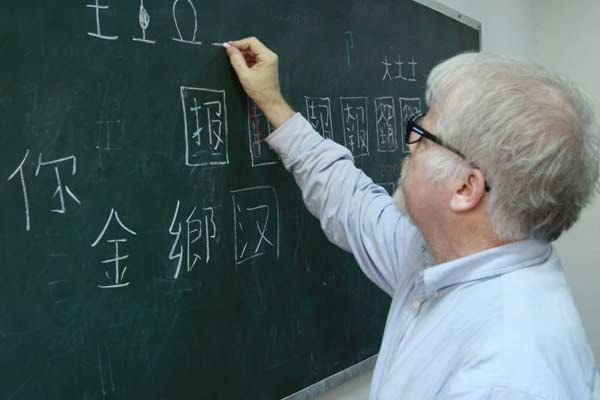Uncle Hanzi is quite a character
By Deng Zhangyu (China Daily) Updated: 2014-04-25 09:43
 |
|
Richard Sears studies the etymology of Chinese characters in his office at Beijing Normal University. [Photo provided to China Daily] |
"If you look at the strokes of the character, it has no meaning and is difficult to memorize. If you know how it evolved and find the logic behind the character, it's easy for foreigners like me to remember," says Sears in fluent Chinese, although he jokes about his Chinese with an "American accent".
Sears' love affair with the Chinese language started 42 years ago, when he woke up one day in the US city of Boston with the idea that he would like to learn Chinese, a language then spoken by one-fifth of the world's population. He bought a ticket to Taiwan and started to study.
He spoke to everyone he met on the street in Chinese. But he found writing Chinese characters incredibly difficult. A professor told him that if he studied the evolution of every character, he might find them easier to remember.
In 1990, he had the idea to make the etymological information of Chinese characters available online, so people could trace them back to their original form. More importantly, he thought it would help foreigners better understand the logic behind Chinese characters. Sears did some research but didn't start the project, until he suffered a near-fatal heart attack in 1994. He did not know how long he had to live and kept asking himself questions like: "What should I do if I only have one day left? One year or 40 years?"
"I finally decided to live like I only have one year left. And to computerize Chinese characters was what I want to do the most," Sears says.
"The experts I visited in China didn't believe I would be able to digitalize Chinese characters while the computer scientist had no interest in doing so. I was alone."
He started reading etymology books and writing programs that made 96,000 archaic Chinese characters available online. To scan the huge number of Chinese characters was also demanding and time-consuming and Sears hired a Chinese to help him.
In 2002, Sears put his website online, free for anyone who is interested. For many years, Sears worked quietly on his website in the US when all of a sudden, in January 2011, he received 600, 000 page views in a single day. A Chinese netizen had written a micro blog about Sears' website and the unassuming academic suddenly found himself thrust into the spotlight.
Sears' story was covered in newspapers and on TV, and he soon became known as "Uncle Hanzi". His website also received many donations from Chinese people. He moved to China in 2012.
- More female officials caught in corruption
- Whampoa veterans recorded with glory
- Police bust 9 terrorist groups in Xinjiang
- Knife-wielding attackers seized in Xinjiang
- New regulation leads to drop in petitioned cases
- Hunan plant shut as probe into lead poisoning begins
- Police boost efforts to combat gambling
- Project offers jobs openings to legal experts
- Experts: Dog meat festival 'illegal'
- Nation looks to upgrade
pipeline networks








